
Kai-Uwe Carstensen
Computational Linguistics at the University of Zurich
Research interests| Projects| Publications| Courses/Teaching| C. V.| Contact
Research interests
The general fields of my interest are language oriented Cognitive Science and Computational Linguistics.
Specific fields of interest:- Spatial and temporal knowledge representation and processing
- Role of attention within cognitive systems and for language
- Language understanding and generation.
- Linguistic text classification
- Cognitive, computational semantics
- General aspects of Computational Linguistics
- Spatial object knowledge (representation)
- Spatial relations
- (Micro)Perspectivization
- Gradation phenomena
- Generation of complex discourse types (e.g., route descriptions)
- Inferring discourse relations from temporal information given in texts
- Teaching Computational Linguistics. Special interest in problem-based interactive learning applications
- Computer-aided summarization of texts
- Language technology, in general
- Quantification, compositionality, and underspecification
- Ontologies
Projects
- LILOG (1987-1991)
This was a basic research project in which a system for understanding texts was developped (for a survey, see "Text Understanding in LILOG").Interestingly, I added a component for generating route descriptions to the system. I did this work as a student of Computational Linguistics and Artificial Intelligence in the subproject LILOG-SPACE at the University of Hamburg.
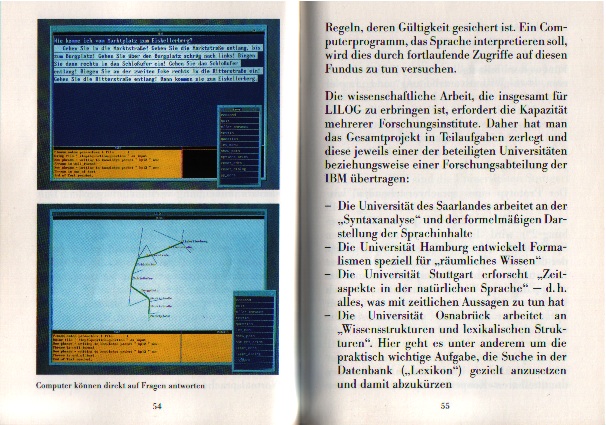
(from: Brenner, Robert (1990), IBM als Partner der Wissenschaft, IBM Forum D12-0035.) - OSKAR (1989-1990)
OSKAR was a small PROLOG-based prototype I developped for testing and extending Ewald Langs cognitive-semantic theory of dimensional adjectives. It is based on spatial conceptual object schemata as representations of qualitative spatial information. These object schemata are used in OSKAR to determine whether specific combinations of dimensional expressions and object names can be conceptually interpreted (for example, "high hill" and "deep valley" are meaningful expressions, while "deep hill" and "high valley" are not).Have a look at our book:
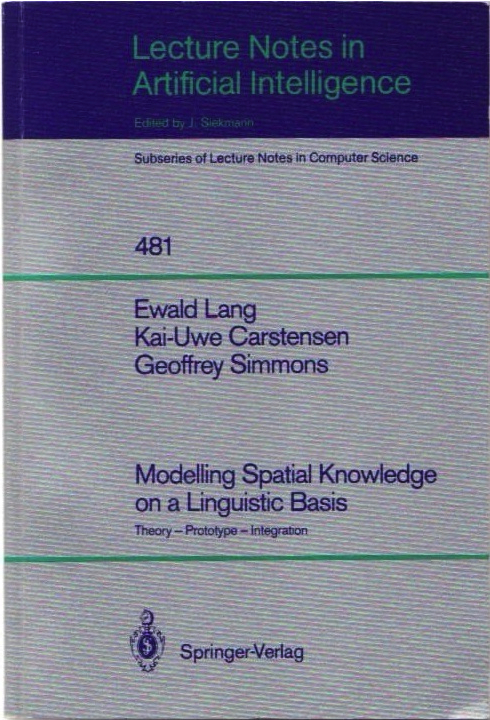
- SPACENET (1994 -)
SPACENET was an EU funded Human Capital Mobility Network that brings together the eleven major European spatial reasoning groups (see the main SPACENET-page for more information). I was participating as a member of Christian Freksa's group at the University of Hamburg. - GROBI
GROBI was an extension of OSKAR which I developped for my dissertation thesis "Sprache, Raum, und Aufmerksamkeit [Language, Space, and Attention]". In addition to object aspects, it took into account relations between objects, the qualitative designation of distances, and aspects of gradation (e.g., "x is less than 2 metres higher (above y) than..."). GROBI thus presented an answer to some problems of the combinatorics of distance and relation expressions occurring at least in German (compare also "a few metres behind the house" and ?"a few metres close to the house"), which I investigated in my thesis.
The theoretical core of the thesis is that changes of (spatial) attention are necessary for the construction of conceptual spatial relations, which has to be reflected in the semantics of corresponding spatial terms. Here you can find the part (written in German) introducing aspects of spatial attention (see also the bibliography of the thesis).
There are other researchers interested in the role of attention in cognition and on attentional semantics, some of which are listed on a website maintained by Giorgio Marchetti. - GERHARD I (10/1996 - 3/98)
The GERHARD-project (German Harvest Automated Retrieval and Directory) aimed at classifying texts on the web and their later retrieval according to topic-oriented queries. In this project, we used the Universal Decimal Classification (UDC) of the ETH Zürich to map natural language texts onto categories of the UDC-hierarchy. There was a small follow-up project GERHARD II. - International Bachelor-Master-Programme Cognitive Science (-9/99)
Since the winter semester 1998/1999, a new international Bachelor-Master-Programme Cognitive Science has been established at the University of Osnabrück. In this context, I worked as an official coordinator.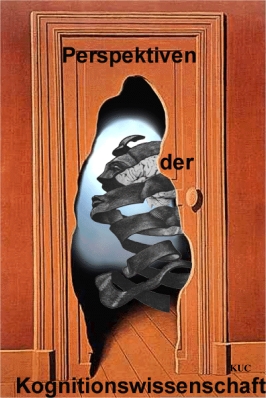
- Computational Semantics (-12/2000)
This was a project at the IMS (Institut für Maschinelle Sprachverarbeitung (Institute for Natural Language Processing)), Stuttgart. Have a look at the project details. - WebCL: Web-based problem-based teaching and tutoring of introductory Computational Linguistics courses
Have a look at the volume of Linguistik online on "Learning and teaching (in) Computational Linguistics" I have edited. - Computer-aided summarization of text
This was a small prototype developed in Python for MacOSX (with PyObjC). Intended to provide several adjustable filters with an additional one-click facility to add/delete a clause to/from the summary.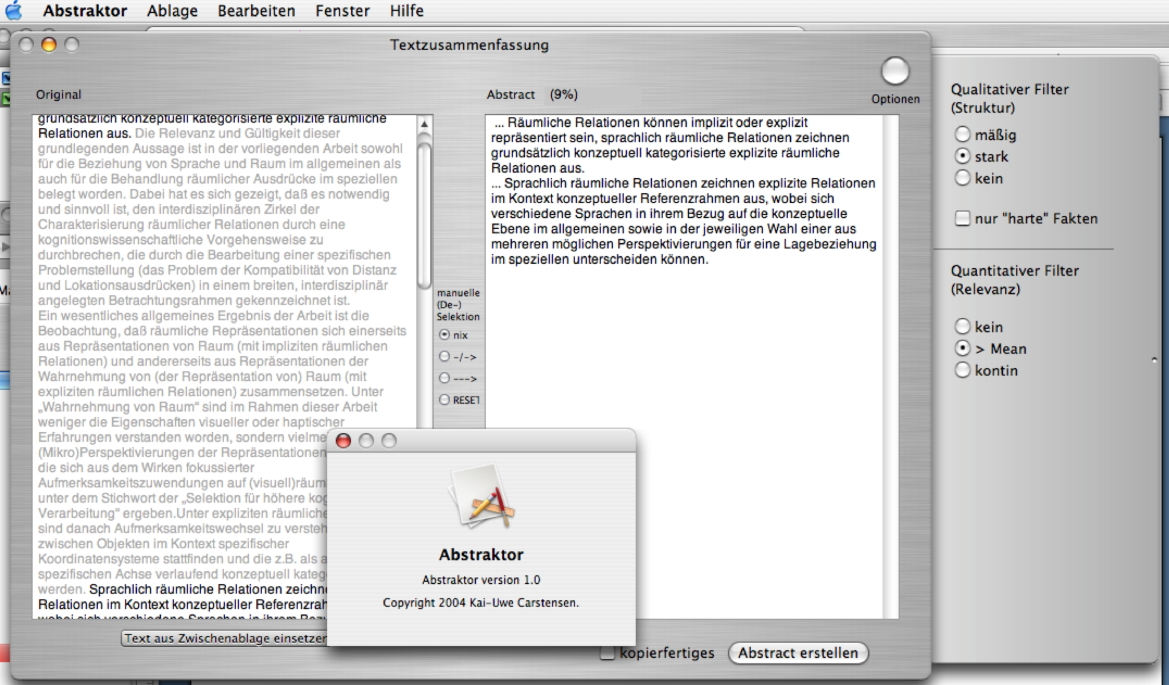
- Co-Editing the German Introduction to Computational Linguistics and Language Technology (Computerlinguistik und Sprachtechnologie - eine Einführung)
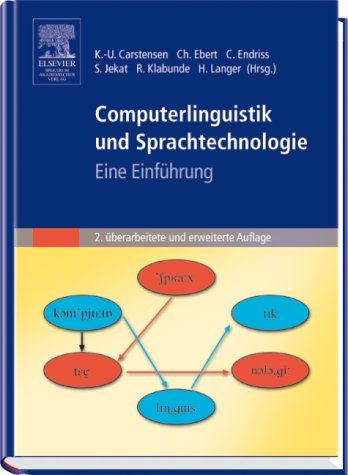
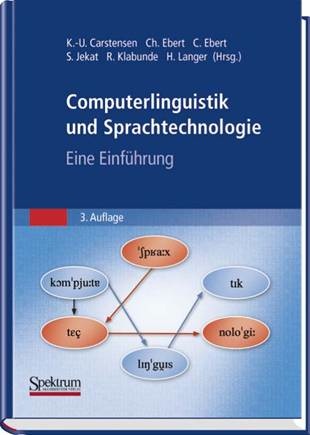
- Language Technology - A survey (Sprachtechnologie - ein Überblick)
Based on my lectures on Natural Language Systems and Language Technology, I have written a small online-book in German on the main applications/system types of computational linguistics. Click on the fake picture to download a pdf.
Über Anmerkungen/Feedback würde ich mich freuen.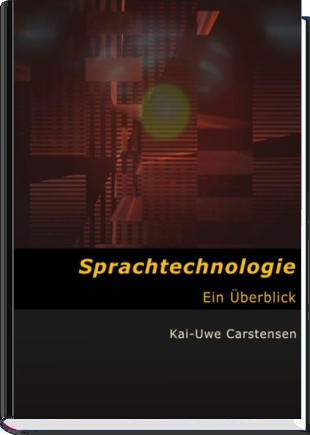
Publications
Here is the list of publications.
Courses/Teaching
- Lectures
- Foundations of Cognitive Science (some of my slides)
- Knowledge representation
- Natürlichsprachliche Systeme/Sprachtechnologie (Natural Language Systems/ Language Technology)
- Grundlagen der Computerlinguistik I (Introduction to Computational Linguistics I)
- Grundlagen der Computerlinguistik II (Introduction to Computational Linguistics II)
- Formale Grundlagen (Foundations of logic)
- Seminars
- Language and Space and the semantics of spatial expressions
- Language/Text generation and the generation of route directions
- Knowledge representation, e.g. this one
- Text summarization
- Computational semantics
- Ontological semantics
- Practical courses
- Practical course to Lecture "Introduction to Artificial Intelligence"
- Introduction to PROLOG
- Elementary introduction to Python
C. V.
- studies of Linguistics and Computer Science at the universities of Trier and Hamburg with a focus on Computational Linguistics and language oriented AI.
- Magister Artium (M.A.) in 1991 with a thesis on the cognitive aspects and the automatic generation of route descriptions
- since then researcher and lecturer at
- the Institute of Semantic Information Processing / Cognitive Science (and the 'Computational Linguistics and AI' department) at the University of Osnabrück
- the Institute for Computational Linguistics (IMS) at the University of Stuttgart
- the Institute of Computational Linguistics at the University of Zurich, Switzerland
- the Institute of Linguistics and Computational Linguistics at the University of Bochum
- the University of Siegen
- Dr.phil. in 1998 with a doctoral thesis on 'Language, Space, and Attention'
- Vertretung der Computerlinguistik-Professur an der Uni Freiburg/Breisgau (Ex- Udo Hahn) (4/2005-3/2007)
Contact
Dr. Kai-Uwe Carstensen
Please contact me via Email or visit my new Homepage
Last update: 23.1.2009